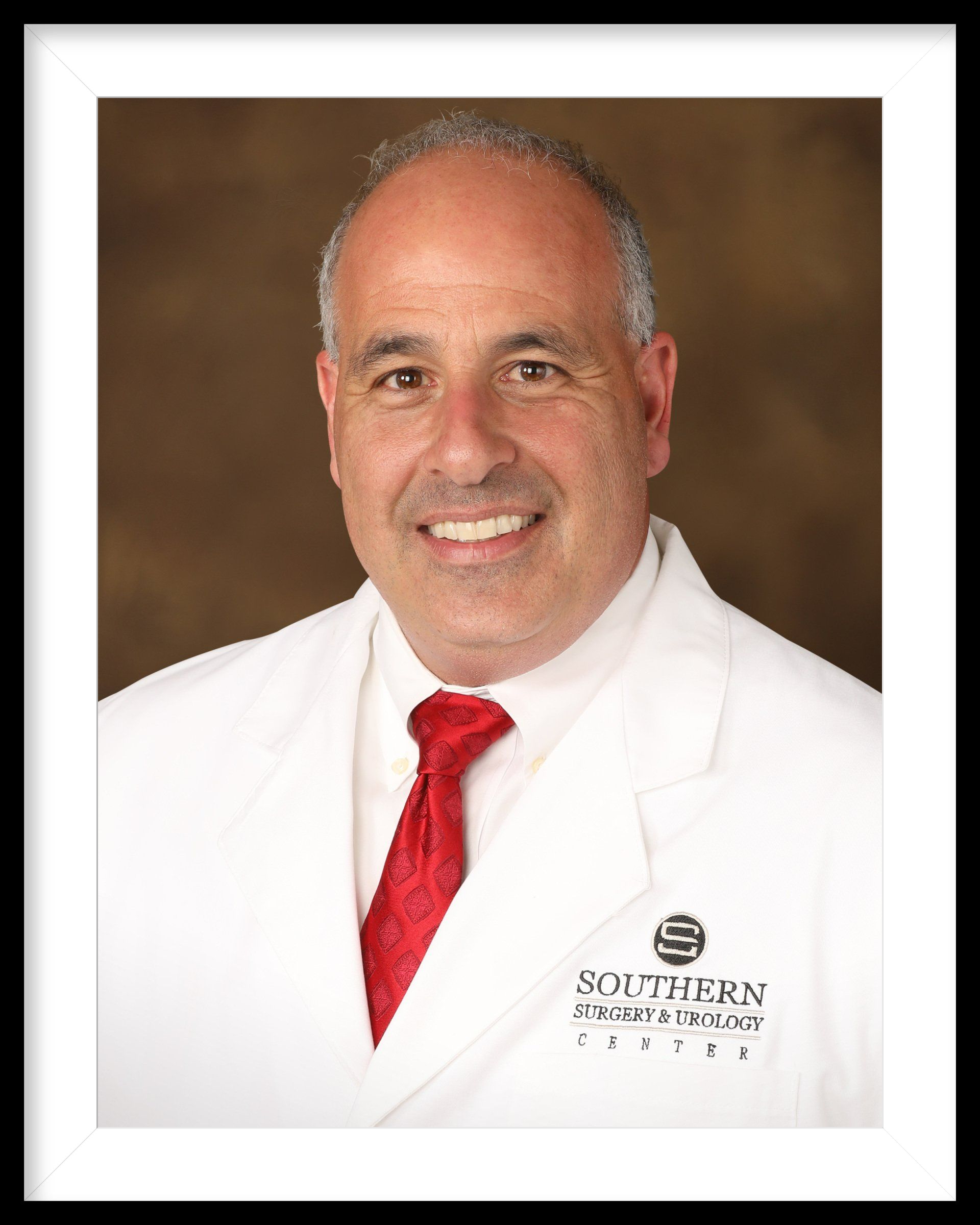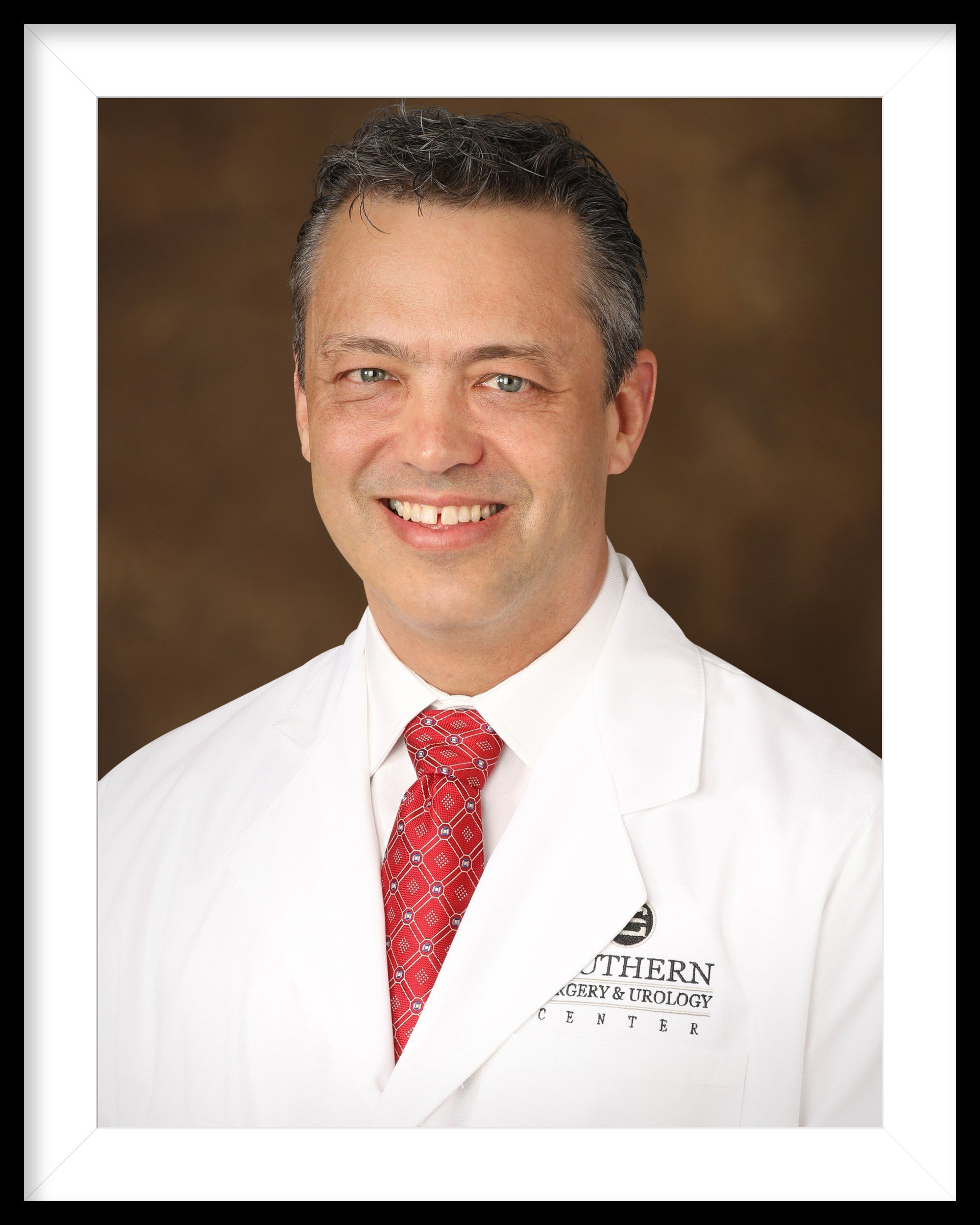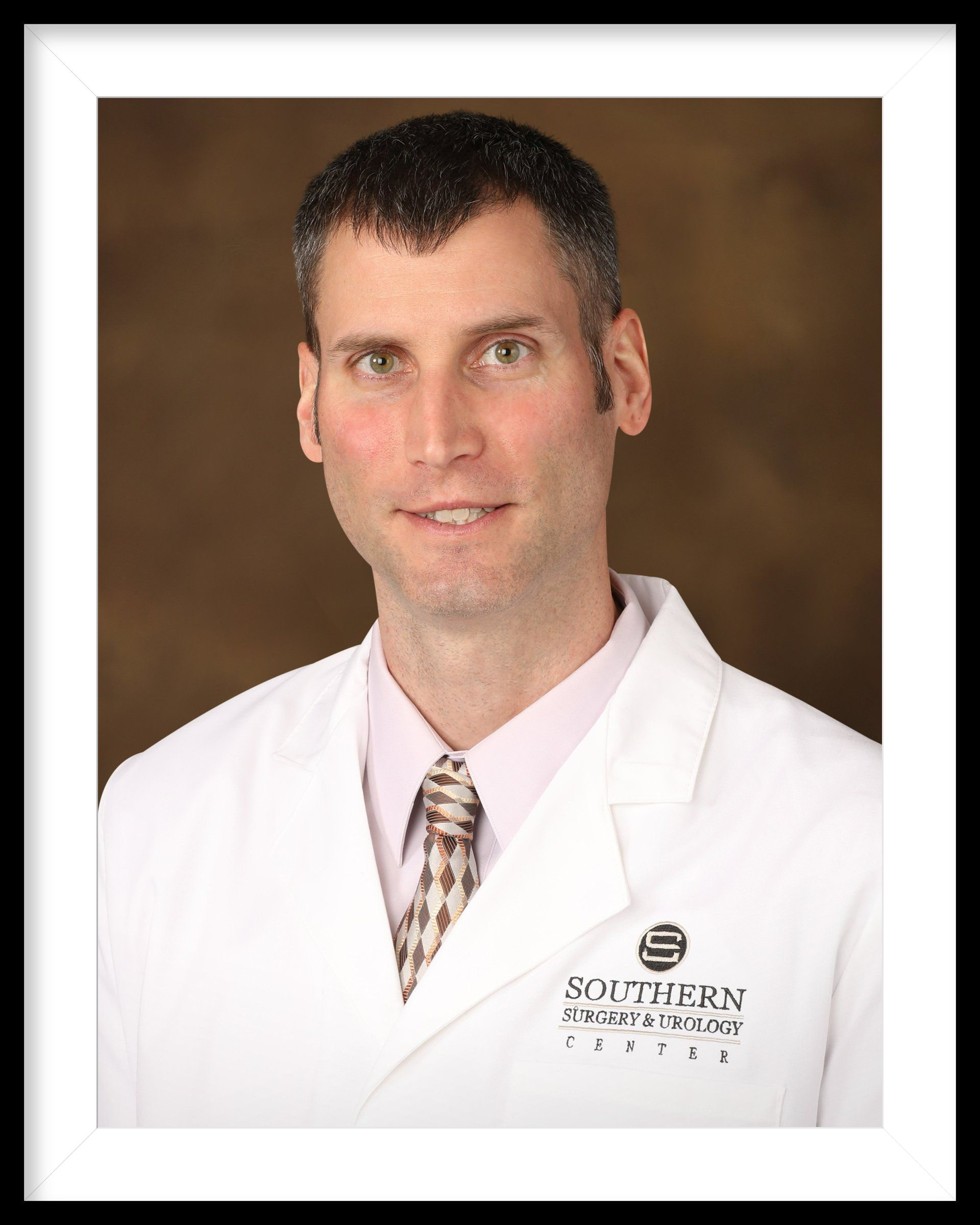GENERAL SURGERY
We treat a full range of General Surgery
services through our outpatient surgery unit and radiology department. Our physicians have more than forty years of combined experience and provide safe
and effective
general surgery services.
Our outpatient surgery unit is fully accredited by the AAAHC and the State of Mississippi. Anesthesia services are administered by providers through Southern Anesthesia.
EXPERIENCED & QUALIFIED PHYSICIANS
George Azar, MD

Wesley Girod, MD

Nate Compton, MD

GENERAL SURGERY SERVICES
Adrenal Gland
There are two adrenal glands, one above each kidney. The adrenal glands are responsible for producing hormones, catecholamines, andsteroids. Occasionally, nodules grow in the glands that may overproduce this substances. If a nodule is growing in size or overproducing chemicals, it may need to be removed. Our surgeons are able to perform this laparoscopic and open.
Anal Fissures/Fistulas
Anal Fissure is a small tear or crack in the lining of the anus. Symptoms include: sharp pain, bleeding, itching, and burning. It can be caused from childbirth, straining during bowel movements. Certain treatments can promote healing and relieve discomfort, but can take several weeks to heal. If the fissure doesn’t heal with these treatments, surgery may be indicated.
Anal Fistula is a chronic abnormal communication between the surface of the anal canal and the perianal skin. It is described as a narrow tunnel with its internal opening into the anal canal and its external opening in the skin near the anus. They can be very painful and irritating due to the drainage of pus and sometimes formed stools will pass through the fistula. Abscesses can occur if the fistula does not heal properly.
Symptoms include: pain, swelling, tenderness, fever, unpleasant odor, skin maceration, pus, serous fluid, and/or itching.
Surgery is normally required to repair the fistula itself and allow drainage and prevent infection. Patients are normally placed on antibiotics to clear up the infection prior to scheduling surgery.
Appendix
The appendix is a small worm-like appendage about the size of a pinky finger. It hangs off the end of the colon in the lower right part of the abdomen. If it becomes inflamed, then the appendix can cause irritation to the abdominal cavity, usually starting as a vague mid-abdominal pain that moves to the lower right part of the abdomen in 12-24 hours.
Treatment for appendicitis is surgical removal of the appendix. This can be done through a small incision in the lower right part of the abdomen, or as a laparoscopic procedure through three incisions: one half-inch incision at the bellybutton, and two quarter-inch incisions in the lower midline of the abdomen. Patients usually stay one or two nights in the hospital, but sometimes can go home the same day.
Bariatric Surgery
Dr. Wesley Girod offers Laparoscopic Sleeve Gastrectomy for weight loss.
The Laparoscopic Sleeve Gastrectomy is a procedure where a large portion of your stomach is removed to restrict the amount of food you can take in. When removing this portion of your stomach, it also removes a peptid that is located in that section of the stomach called Grelin. This peptid is what drives your appetite. Once this portion is removed, basically your appetite is suppressed.
Breast
Types of Breast Issues Treated:- Abnormal Mammogram
- Breast Biopsy for mass/lump
- Fibrocystic Disease
- Gynecomastia
- Breast Cancer
Breast Surgeries We Offer:
- In Office Ultrasound Biopsy
- Open Surgical Biopsy
- Lumpectomy
- Mastectomy
- Axillary Dissection
- Sentinel Lymph Node Biopsy
Many women find unusual lumps or masses in their breasts, and we recommend that all women over the age of 40 get an annual mammogram AND perform monthly breast self-exam. If you find a lump that needs evaluation, we can perform fine-needle aspirate or core needle biopsy in the office, or an excisional breast biopsy done as an outpatient. A fine-needle aspirate (FNA) is removing a few cells in a very small needle to be evaluated by a pathologist under a microscope. A core needle biopsy is similar but uses a larger needle to obtain a larger piece of tissue. We can use our in-office ultrasound to help find smaller lumps and guide these procedures.
An excisional breast biopsy involves a trip to the operating room with anesthesia, usually sedation and local anesthesia (similar to a Novocain injection at the dentist). A suspicious lump can be removed through a small incision, and the scar can be hidden in an inconspicuous spot. Nearly all patients go home the same day.
We work closely with plastic surgeons to offer reconstruction options. We also work closely with medical oncologist and radiation oncologist offering the latest therapies for breast cancer.
Chemotherapy Port Placement
We place Chemotherapy Ports for multiple types of cancer including:
- Breast
- Colon
- Rectal
- Pancreatic
- Lymphoma
- Leukemia
- Gastric
- Liver
Colonoscopy
The Centers of Medicare & Medicaid Services (CMS) “Preventative Screening” Initiative passed in January 2011 dictates that patients undergoing a “screening colonoscopy” will not be held to their coinsurance or deductible responsibilities.
The definition of a “screening colonoscopy” per CMS guidelines is as follows: a “screening colonoscopy” is considered when performed on a patient who does not have any signs or symptoms in the lower GI anatomy PRIOR to the scheduled test. Any symptom such as change in bowel habits, diarrhea, constipation, rectal bleeding, anemia, etc. prior to the procedure and noted as a symptom by the physician in your medical record may change your benefit from a screening to a diagnostic colonoscopy.
INSURANCE BENEFITS:
- 1. Check with your insurance company for preventive “screening” colonoscopy coverage under the age of 45.
- 2. If you have had a colonoscopy within the last ten (10) years your insurance will NOT PAY for another screening colonoscopy.
- 3. If you have had a previous colonoscopy and the results indicated colon polyps, you are NOT eligible for a “screening” colonoscopy. You are now considered as having a diagnostic colonoscopy and your insurance will NOT pay 100% of this procedure.
Please be advised that if during the procedure your doctor finds polyps, these polyps must be removed and sent for pathological testing. Your insurance company may not consider this as a Preventive Screening Benefit. They may apply this toward your deductible and/or coinsurance.
Colon Surgery
We perform the following types of surgery: bowel obstruction, colonoscopy colon resection, polyps, robotic-assisted laparoscopic, cancer and treatment of diverticulosis/diverticulitis.
There are several indications to remove portion or all of the colon and/or to remove the rectum. These including bleeding, polyps unable to be removed by endoscopic, cancer, diverticulitis, strictures, ischemia, ostomy creation/closure, and obstructions. Surgery can be performed open, laparoscopic or robotic. Surgery involves removing the diseased portion of the colon and re-connecting the remaining segments. Patients typically stay in the hospital a few days recovering from the procedure.
Gallbladder/Gallstones
We perform the following types of surgery:
- Open
- Laparoscopic
- Robotic Assisted Single Port Laparoscopic Cholecystectomy – Removal of Gallbladder
*Dr. Wesley Girod is the only General Surgeon in the area offering this robotic assisted surgery.
Many people have gallstones, and some people will become symptomatic, having right-sided abdominal pain, nausea, vomiting, jaundice, or any combination of these. Others may not have gallstones but have a dysfunctional gallbladder that doesn’t empty properly. A painless ultrasound of the gallbladder is the first step in determining the exact nature of the problem.
Removal of the gallbladder is done laparscopically through four small incisions using video equipment to see into the abdomen. Many people go home the same day or the morning after surgery. Rarely, patients need a larger incision over the upper right part of the abdomen to remove the gallbladder. This is equally effective to remove the gallbladder, but requires a longer hospital stay and longer recovery time.
Hemorrhoids
Many people suffer from hemorrhoids, but most do not like to talk about the problem. Hemorrhoids are engorged veins around the anus that can get inflamed, protrude, itch, bleed and cause severe pain. Often milder episodes can be relieved with warm tub baths and over-the-counter medications such as Anusol, Tuck’s, or Preparation H.
If your hemorrhoids are severe enough to require an operation, there is a new option available called the PPH procedure (Procedure for Prolapse and Hemorrhoids). A circular stapler is inserted into the rectum and staples the rectal mucosa in a circle, thereby lifting hemorrhoid tissue back up into the rectum and dividing the blood vessels feeding the hemorrhoid. Some patients choose the Ferguson hemorrhoidectomy, in which hemorrhoids are excised from the anus and rectum and the area closed with sutures. Both of these procedures are done on an outpatient basis.
We also offer services for Hemorrhoidal banding.
Hernia
We perform the following types of surgery:
- Umbilical
- Femoral
- Inguinal
- Ventral/Incisional-Laporascopic & Open
- Abdominal & Complex Abdominal Wall Reconstruction
A hernia occurs as a weakening of tissue, causing underlying intestine or pre-intestinal fat to bulge out. Most often this occurs in the groin area, or at the umbilicus (belly-button). It can also happen in an old incision. Most hernias should be repaired because of the risks of incarceration, which is intestine getting stuck in the hernia, or strangulation, which is intestine getting stuck in the hernia and dying.
Hernias can be repaired as an open procedure (with an incision over the hernia) or as a laparoscopic procedure (using two or three small half-inch incisions and video cameras to repair the hernia). We use mesh during surgical procedures.
Ingrown Toenails
Ingrown Toenails are a common problem where the corner of the nailovergrows into the soft tissues around the nail. Symptoms include pain,redness, and swelling. Occasionally infection may result. This typicallyaffects the great toe. Treatment involves partial or complete removal of thenail and nail bed. This can be performed in the office with local anesthetic.
Lung
Pilonidal Cyst
A Pilonidal cyst is a cystic structure that develops along the tailbone near the cleft of the buttocks. Treatment and management depends on the extent and severity of the disease. Recurrence of a Pilondial cyst is very common.
Symptoms include: pain, redness, warmth of skin, localized swelling, drainage
Antibiotics will be prescribed to clear up infection. Surgery may be required, if the cyst does not heal appropriately.
Stomach/Reflux
We perform the following types of surgery:
- Gastric Resections for ulcers or cancer
- Anti-Reflux surgeries such as: Nissen & Toupet
We offer treatment of several disease processes of the stomach including gastroesophageal reflux disease (GERD), stomach ulcers, and stomach cancers.
Patients with GERD may also have a hiatal hernia, an increase in size of the natural opening in the diaphragm for the esophagus. Surgical correction involves wrapping portion of the upper stomach around the esophagus in addition to repairing the hiatal hernia if present. Depending on your unique situation, you surgery may involve a complete wrap (Nissen) or a partial wrap (Dor or Toupet). Patients are typically on a liquid or soft food diet temporarily after the surgery.
Patients with stomach cancer, masses, or ulcers may need surgery to remove portion or all of the stomach depending on the location of the cancer, mass, or ulcers. In the case of ulcers, the vagus nerves may also be divided to reduce to amount of acid produced by the stomach. Once portion of the stomach has been removed, the remaining section is reconnected to the intestinal tract.
Skin
We perform the following types of surgery:
- Abscess & Hidradenitis
- Lesion
- Sebaceous Cyst
- Lipomas
- Cancer- including squamous cell, basal cell, melanoma, as well as lymph node sampling when indicated.
Spleen
The spleen is a hematologic organ in the left upper abdominal. Certain disease process can cause enlargement of the spleen causing pain or changes in the patientʼs blood counts. When indicate, we can remove the spleen via an open or laparoscopic technique.
Thyroid/Parathyroid Disease
The thyroid gland is an endocrine gland in the neck consisting of two lobes that is found in the front of the neck. The thyroid gland secretes thyroid hormones which primarily influence the metabolic rate and protein synthesis. The thyroid can be affected by several diseases. A few of the most common thyroid issues are Hypothyroidism, Hyperthyroidism, and Goiters.Hyperthyroidism
occurs when the gland produces excessive amounts of thyroid hormones.
Hypothyroidism
occurs when the gland doesn’t produce enough thyroid hormones.
Goiters
occur when the gland becomes enlarged.
The Thyroid can also develop several types of nodules, which can be benign or cancerous. We have the ability to perform in office ultrasound guided fine needle aspiration of thyroid nodules.
Parathyroid
There are four parathyroid glands in the body. Two glands, an inferior and a superior, sit behind each lobe of the thyroid gland. The function of the parathyroid gland is to help regulate the calcium levels in the body. Sometimes, a gland grows and becomes overactive causing an increase in calcium levels in the blood. Symptoms can include body aches, headaches, urinary stones, fatigue, and depression. If no correct, long-term effects may including urinary issues or osteoporosis. When overactive, one or more of the parathyroid glands may need to be removed to restore normal calcium levels.
We provide treatment for all of these conditions and surgical procedures, if needed.







